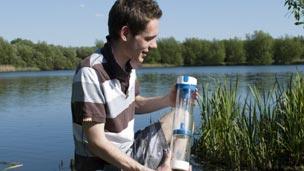Clean water bottle wins UK leg of James Dyson Award
- Published

Tim Whitehead is now in the running for a ВЈ10,000 prize
A bottle that uses ultraviolet light to sterilise drinking water has won the UK leg of the James Dyson Award.
The Pure bottle is the brainchild of Timothy Whitehead, a design and technology graduate from Loughborough University, who had the idea while travelling in Zambia.
It eliminates the need for chlorine and iodine tablets which take 30 minutes to work and can leave an unpleasant taste.
The invention will now go forward to the awards' global final in October.
Mr Whitehead said: "I thought that there must be a way of using new technology to clean drinking water. I began experimenting with using ultraviolet light to sterilise water quickly, without any distortion to taste."
Saving lives
The water bottle contains two chambers. Dirty water is put in an outer chamber and the inner chamber is plunged through it, filtering water particles as small as four microns.
Once filtered, the water is sterilised by a wind-up ultraviolet bulb in a process lasting 90 seconds.
A prototype was effective in killing 99.9% of bacteria and viruses.
Professor Matthew Harrison, who is one of the judges and also director of education programmes at the Royal Academy of Engineering, commented: "Pure provides a practical solution to a real problem - how to get clean drinking water in the most hostile of conditions.
"It has the potential to make a real difference to people's lives."
The sterilisation water bottle will go up against inventions from around the world in the worldwide final of the James Dyson Award in October.
Other finalists include a lifeboat from Austria that can be transported by plane for high speed rescues, a bin from Switzerland that decomposes organic waste without any smells, and a car from Australia that can drive through rugged terrain and penetrate a fire, to allow firefighters to control blazes from the inside.
The James Dyson award was set up to recognise those who provide answers for everyday problems. The international winner receives ВЈ10,000 for themselves and ВЈ10,000 for their university department.
As a national winner, Mr Whitehead has already won a visit to the Dyson research and development centre.